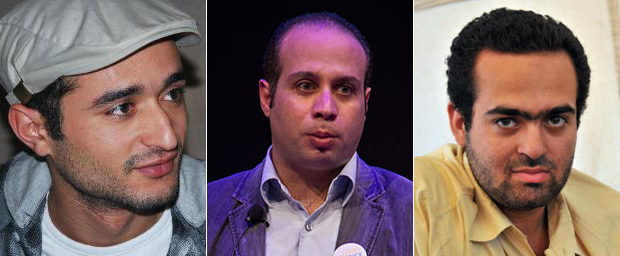4 Apr 2014 | Egypt, News and features

Leading bloggers Ahmed Douma, Ahmed Maher and Mohammed Adel are among those who are currently in prison
Earlier this month, two police officers were sentenced to ten years for the torture and manslaughter of blogger, Khaled Said. But this ruling does not mark change for Egypt’s political system. Instead, it is a token gesture set against a catalogue of abuse.
Three years on from the revolution, Egypt seems tired of turmoil and apathy is mounting. The youth movement, April 6, made the decision to boycott the recent referendum and the idea spread. Although the country’s younger generation makes up a quarter of the population, only a tiny minority turned up to vote. Their absence meant the new constitution was approved by more than 98%.
However political activist, Salma Said believes this low attendance was down to a different issue. “The youth didn’t participate because the youth are in jail”, she said via Twitter.
Her comment highlights the alarming increase of politically motivated arrests. There is a clear targeting of bloggers, journalists and activists. In Egypt, the price for dissent is high.
Leading bloggers Ahmed Douma, Ahmed Maher and Mohammed Adel are among those who are currently in prison. Sentenced to three years with hard labour and a fine of EGP 50,000, they were arrested for their defiance of a new law restricting protest.
Yet it seems their real crime is their criticism of authority, paired with online influence – collectively they have nearly 4 million followers on Twitter. In prison, the injustices continue. Earlier this month, they complained of being beaten by guards, which is not the first time they have suffered mistreatment in jail.
Their arrests are part of a crackdown on dissent – their imprisonment is an attempted gagging.
At the beginning of the year, Alaa Abdel Fattah became another high profile blogger to be arrested, along with his sister Mona Seif. Accused of torching the campaign headquarters of a former presidential candidate, the pair firmly protested their innocence but each received one year suspended sentence.
Mona Seif is vocal in her consistent criticism of the SCAF, the Egyptian military’s governing body. She works to expose the SCAF’s targeted arrests of protestors and their mistreatment of detainees. An ongoing part of her project involves asking those who have been released to record their experience and to document any injuries suffered in jail.
While Seif was released, Fattah was not. More accusations were brought against him, this time of inciting protest – a charge for which he spent 115 days behind bars without trial. He was eventually released late last month and is now awaiting trial on April 6. He showed his resolve on Twitter: “We will continue….”
Again, Fattah’s arrest seems to be punishment for his activity online. In 2005, he won the ‘Reporters without Borders’ prize for his hugely popular blog ‘Manalaa’, gaining international attention. He was one of the leading faces in 2011’s revolution and he is still a firm advocate of free expression.
The crackdown on government critics and pro-democracy campaigners has shaken Egypt’s internet generation, leaving them with a feeling of powerlessness. In a letter dated December 24, Alaa Abdel Fattah wrote to his sisters: “What adds to my frustration is that this imprisonment has no value. This is no struggle and there is no revolution”.
Award winning blogger, Sandmonkey shares Fattah’s beaten attitude in a post where he addresses the country’s older generations: “Our depression stems from our knowledge that you will not fix anything.”
As mainstream media returns to its pre-revolution ways by siding with the government, it seems the blogger’s role is more important than ever. Independent voices must be heard. But support is fading for revolutionaries as newspaper headlines and editorials brand them “anarchists” and “thugs”.
Many Egyptians seem happy to sacrifice certain freedoms for stability. With liberal commentators being squeezed out of political discourse and into prison, the public begin to believe that an authoritarian state is the only alternative to Islamic extremism.
For years, Egypt’s bloggers have been subject to savage beatings, intimidation and even sexual assault at the hands of the police. Today, it seems that little progress has been made despite the revolution. With many figures of hope in jail or exile, the future seems bleak. Fattah believes it’s as if they’ve waged “war on a whole generation.” But Egypt’s youth must not give up the fight.
This article was published on 4 April 2014 at indexoncensorship.org
23 Mar 2011 | Egypt, Middle East and North Africa
Digital activism has long been a way of life in Egypt; from monitoring political corruption to protesting against police brutality
Egypt has always been one of the fastest and most enthusiastic cultures in the Middle East to embrace technology. Activist Egyptian bloggers such as Wael Abbas made their reputation by posting incendiary videos showing endemic police brutality and the use of torture in interrogation. In at least two cases, evidence of torture was circulated online and led to the prosecution of police officers.
“Now everyone can see what’s happening in the police stations. That’s something that touches a nerve in ordinary citizens who are not political activists,” Abbas says. One Egyptian online activist created the ‘piggipedia’, a Flickr account showing a gallery of senior Egyptian police officers photographed at demonstrations.
The murder of Khaled Said in Alexandria last June became a new rallying point for protest, after he was beaten to death in public, in front of witnesses, by plain-clothes police officers. Autopsy photographs of his badly battered face circulated immediately on the internet, sparking a month-long round of demonstrations and vigils – many of which were organized and announced on Facebook and Twitter. The Facebook group ‘We are all Khalid Said’ later became a hub for the January uprising.
The internet was already well established as a virtual meeting point for evading the country’s harsh laws against political activism under President Hosni Mubarak. In 2008, a 30-year-old civil engineer named Ahmed Maher created a Facebook group called the 6 April Movement to commemorate the date of a violent clash between police forces and a group of striking textile factory workers in the Nile Delta city of Mahalla al Kubra. The page then took on a life of its own, gathering more than 70,000 members and expanding beyond labour activism to encompass all manner of political activity. “We can’t have a proper headquarters. It’s not like we can just rent an office,” Maher says. “But on the net there are groups like ours meeting 24 hours a day.”
Last March, employees at the popular online news site Islam Online went on a mass strike to protest against editorial interference by the site’s management. The strike was broadcast over the internet thanks to a live feed on Bambuser, the video-streaming website. In addition to documenting the chants and vigils, many strikers used the streaming video feed to give testimonials directly to viewers.
Before the uprising in January, active bloggers such as Ahmed Maher and Wael Abbas were shifting their energies to Twitter and other online platforms. The appeal, they say, is a new level of interactivity and the creation of a virtual community. Abbas, in particular, has employed his Twitter account in a novel way. After years of posting videos that embarrassed the government, he would be detained, questioned and searched while leaving or arriving in Egypt. On at least one occasion, the authorities confiscated his laptop. As a result, whenever Abbas headed to the airport, he would tweet the news to his 5,000 followers. If he was detained or questioned, he would tweet that as well and the Egyptian online community would immediately rally behind him. In early February, as the Tahrir Square uprising was entering its second week, Abbas was arrested, questioned and released.
The parliamentary elections last year were the first to receive digital scrutiny. Anyone following #egyelections on Twitter was deluged with information from the estimated 44,000 polling stations spread across 29 governorates. Activists, journalists and election monitors all posted and forwarded the latest updates and pictures from around the country. If a monitor or a journalist was turned away from a polling station by police, the incident was instantly posted or tweeted. When Sobhi Saleh, a Muslim Brotherhood-affiliated MP, was attacked in Alexandria, the news circulated through Twitter so fast that journalists and human rights workers were able to interview him in hospital.
“When a new report came in from our reporters in the field, the first thing I would do is put up feeds on our Twitter account, before I even posted the news on the website,” says Lina Attalah, co-managing editor of the English edition of al Masry al Youm , Egypt’s largest independent daily newspaper.
President Hosni Mubarak’s ruling National Democratic party won more than 90 per cent of the vote in a victory that generated widespread condemnation and allegations of voter intimidation, strong-arm tactics and old-fashioned ballot box stuffing. The electronic evidence posted on Twitter, Facebook and YouTube amounted to a damning and comprehensive dossier of the day’s injustices.
Until the uprising in January, activists like Maher and Abbas would express frustration at the inability of Egypt’s robust internet political scene to translate into mass demonstrations. Most Egyptian protests would still amount to the same group of people invariably surrounded by central security riot police. But that’s all history now.

This article is taken from the current issue of Index on Censorship magazine, The Net Effect. Click here to subscribe



